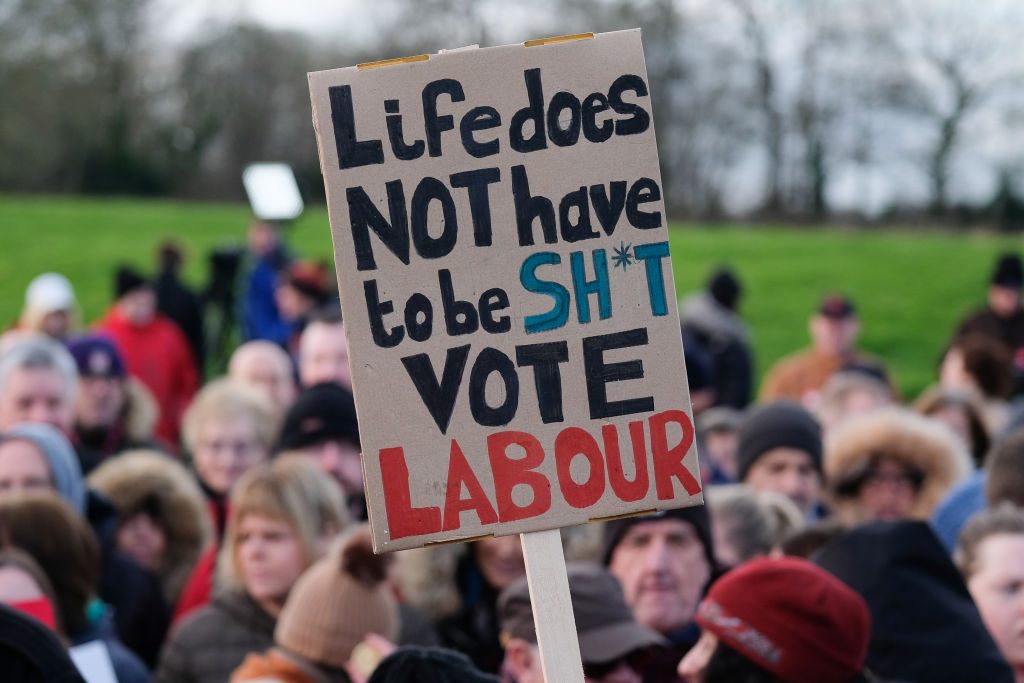I initially misread the reaction of Labour’s leading Corbynites and social media outriders to the party’s most cataclysmic defeat since 1935. I thought they were arguing Labour lost because of Brexit; that Jeremy Corbyn’s unpopularity was purely due to media vilification; and its manifesto evoked only a positive response on the doorstep simply because they wanted to persuade members they should vote for a continuity Corbynite candidate in the forthcoming leadership election.
But as the days passed I realised I was wrong. At least some of them genuinely believe that, as Corbyn himself put it, Labour ‘won the argument’ on 12 December. As newly-elected MP Claudia Webbe’s incoherent defence of the manifesto suggests, if they do not all have the words to articulate their position, Cobynites feel this very deeply.
And if Lloyd Russell-Moyle was widely mocked, as in his election-night speech he excitedly shouted the party would fight on against Boris Johnson’s government in the workplaces and on the streets, his heartfelt defiance was widely shared across the left Labour Twittersphere.
Other Corbynites reacted to the disaster less viscerally and more intellectually but did so in an even more utopian fashion. Guardian columnist Aditya Chakrabortty believes Labour’s way back includes teaching voters political and economic literacy. He is not the only one who seems to imagine that ultimate victory lies in ignorant Brits being re-educated in the precepts of Corbynism.
As someone writing a history of the Labour party from the late 1970s, I was increasingly struck by comparisons with how the hard left reacted to the last time Labour crashed in the polls: June 1983.
Labour went to the country with a manifesto written by Tony Benn and his supporters, one defined by an unprecedented expansion of the state into social and economic life. This saw the Conservatives win a 144-seat majority and reduce Labour to 27.6 per cent of the vote and to a mere 209 MPs. Coincidentally, if 2019 was Labour’s worst results since 1935 in terms of seats, 1983 was its poorest since 1935 in terms of vote share.
Despite the scale of Labour’s reverse, however, just days after Tony Benn claimed it was ‘a democratic socialist bridgehead’ upon which the party should build in the future. For, Benn argued, Labour’s ‘openly socialist policy’ had attracted the votes of nearly nine million people, ‘a remarkable development by any standards’. He was not alone in holding that view: it pervaded the hard left.
In the now-yellowing pages of London Labour Briefing, many gave vent to their frustration with the electorate, the rest of the party, opinion polls and the media in terms that showed just how far denialism is a defining characteristic of Labour’s far-left.
Instead of looking the result in the face and wondering if their programme was at all responsible for the party being rejected by so many traditional Labour voters, contributors called for ‘the methods of struggle instead of the methods of compromise’ and for the party to ‘harness the despair of the unemployed, the anger of women, the determination of anti-nuclear protestors, and the rebelliousness of youth in Labour’s cause.’
Corbyn himself claimed the party simply did not get its message across, so argued for Labour to focus more vigorously on campaigning to put that right. But if there was one single reason that emerged from this analysis it was that the Falklands War lost it for Labour, as convenient an explanation as Brexit is in 2019.
All political parties are fantasy factories. They each contain those who fervently believe they offer the one and true solution to Britain’s vast and complex problems.
If rejected at the polls, they commonly respond by believing it was not their message which was to blame, but how it was communicated to the poor incomprehensive electors.
Such desperate dedication is necessary to keep members going, knocking on doors in all weathers and turning up to often dreary meeting in cold church halls. But – usually – they possess leaders who temper this enthusiasm with the insight that sometimes they have to bend their message to what the voters say they want.
In 1983, Benn could not stand for leader as he had just lost his seat. In his place stood the uninspiring veteran left-winger Eric Heffer who won just 6.6 per cent of members’ votes. The victor was Neil Kinnock who recognised a defeat when he saw one and slowly took the party in a different direction from the one Benn and his followers desired.
In fairness to the Bennites, the 1983 result was the outcome of many factors but in simply denying their contribution they found themselves increasingly isolated within Kinnock’s party.
Similarly, the 2019 disaster had several causes. But in rejecting any possibility of their own culpability, Corbynites – many of whom like the leader, shadow chancellor John McDonnell and Momentum boss Jon Lansman were active participants in the 1983 campaign – are demonstrating a familiar ideological blindness.
Today, however, there is one important difference with 1983. The Bennites had lost control of the party by the election but in 2019 Corbynites run Labour and are doing their best to ensure a latter-day Kinnock does not win the leadership.
And they may well succeed in persuading members to vote for a leader that does not want to face up to the hard realities that now confront the party, but instead wants to keep it running on the fantasy that the problem is not them, but the millions of Britons who failed to vote Labour on 12 December.
Steven Fielding is Professor of Political History at the University of Nottingham and is writing ‘The Labour Party: from Callaghan to Corbyn’ for Polity Press, to be published in 2021






Comments